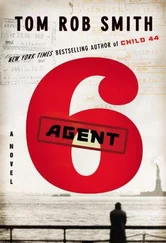Tom Smith - The Secret Speech
Здесь есть возможность читать онлайн «Tom Smith - The Secret Speech» весь текст электронной книги совершенно бесплатно (целиком полную версию без сокращений). В некоторых случаях можно слушать аудио, скачать через торрент в формате fb2 и присутствует краткое содержание. Жанр: Триллер, на английском языке. Описание произведения, (предисловие) а так же отзывы посетителей доступны на портале библиотеки ЛибКат.
- Название:The Secret Speech
- Автор:
- Жанр:
- Год:неизвестен
- ISBN:нет данных
- Рейтинг книги:5 / 5. Голосов: 1
-
Избранное:Добавить в избранное
- Отзывы:
-
Ваша оценка:
- 100
- 1
- 2
- 3
- 4
- 5
The Secret Speech: краткое содержание, описание и аннотация
Предлагаем к чтению аннотацию, описание, краткое содержание или предисловие (зависит от того, что написал сам автор книги «The Secret Speech»). Если вы не нашли необходимую информацию о книге — напишите в комментариях, мы постараемся отыскать её.
The Secret Speech — читать онлайн бесплатно полную книгу (весь текст) целиком
Ниже представлен текст книги, разбитый по страницам. Система сохранения места последней прочитанной страницы, позволяет с удобством читать онлайн бесплатно книгу «The Secret Speech», без необходимости каждый раз заново искать на чём Вы остановились. Поставьте закладку, и сможете в любой момент перейти на страницу, на которой закончили чтение.
Интервал:
Закладка:
He’d stopped worrying that the sea might0 swallow this ship or that ice might rip the hull. His fear had been that one night he’d fall asleep only to wake, his arms and feet held fast by the other guards, dragged, as those women were dragged, fighting, screaming, thrown over the side, falling into the black, freezing ocean where he would splash helplessly for a minute or two, watching the lights of the ship grow smaller and smaller.
For the first time in seven years those fears no longer troubled him. The entire guard contingent of the ship had been replaced. Perhaps their removal had something to do with the reforms sweeping the camps. He didn’t know. It didn’t matter: they were gone, all of them, except for him. He’d been left behind, excluded from their change in fortune. For once, exclusion suited him just fine. He found himself among a new group of guards none of whom hated him, none of whom knew anything about him. He was a stranger again. Anonymity felt wonderful, as if he’d been miraculously cured of a terminal sickness. Presented with an opportunity to start afresh, he intended to do everything in his power to make sure he was part of the team.
He turned to see one of the new guards smoking on the other side of the deck, staring at the dusk skyline, no doubt brought outside by the noise of the collision. A tall, broad-shouldered man in his late thirties, he had the poise of a leader. The man — Iakov Messing — had said very little during the journey. He’d volunteered no information about himself and Genrikh still had no idea if Iakov was staying aboard the ship or whether he was merely en route to another camp. Tough with the prisoners, reticent with the other guards, a brilliant card player and physically strong, there was little doubt that if a new group were going to form, as it had done on the last ship, it would form with Iakov at its center.
Genrikh crossed the deck, greeting Iakov with a nod of his head and gesturing at his pack of cheap cigarettes.
— May I?
Iakov offered the pack and a lighter. Nervous, Genrikh took a cigarette, lit it, and inhaled deeply. The smoke was coarse on his throat. He smoked infrequently and tried his best to pretend that he was enjoying the experience, sharing a mutual pleasure. It was imperative he made a good impression. However, he had nothing to say. Iakov had almost finished his cigarette. He’d soon be going back inside. The opportunity might not arise again, the two of them alone — this was the time to speak.
— It’s been a quiet voyage.
Iakov said nothing. Genrikh flicked ash at the sea, continuing:
— This your first time? On board, I mean? I know it’s your first time on board this ship, but I was wondering if, maybe, you’ve… been on other ships. Like this.
Iakov answered with a question:
— How long have you been on board?
Genrikh smiled, relieved to have solicited a response:
— Seven years. And things have changed. I don’t know if they’ve changed for the better. These voyages used to be something…
— How so?
— You know… all kinds of… good times. You know what I mean? Genrikh smiled to underscore the oblique innuendo. Iakov’s face was impassive:
— No. What do you mean?
Genrikh was forced to explain. He lowered his voice, whispering, trying to coax Iakov into his conspiracy:
— Normally, around day two or three, the guards—
— The guards? You’re a guard.
A careless slip: he’d implied he was outside the group and now he was being asked whether that was the case. He clarified:
— I mean me, us. We.
Emphasizing the word— we— and then saying it again for good measure.
— We talk to the urki , to see if they’re willing to make us an offer, a list of names, a list of the politicals, someone who’d said something stupid. We ask what they’d want in return for this information: alcohol, tobacco… women.
— Women?
— You heard of “taking the train”?
— Remind me.
— The line of men who take their turn, with the female convicts. I was always the last carriage, so to speak. You know, of the train of men, who took their turn.
He laughed:
— Last was better than nothing, that’s what I say.
He paused, looking out at sea, hands on his hips, longing to scrutinize Iakov’s reaction. He repeated, nervously:
— Better than nothing.
Squinting in the dim dusk light, Timur Nesterov studied the face of this young man as he boasted about his history of rape. The man wanted to be patted on the back, congratulated and assured that those times were the good times. Timur’s cover as a prison guard, as officer Iakov Messing, depended upon remaining invisible. He couldn’t stand out. He couldn’t kick up a fuss. He was not here to judge this man or to avenge those women. Yet it was difficult not to imagine his wife as a convict aboard this ship. In the past she’d come very close to being arrested. She was beautiful and she would’ve ended up at the mercy of this young man’s desire.
Timur tossed the cigarette into the sea, moving indoors. He was almost at the tower door when the guard called out after him:
— Thanks for the smoke!
Timur stopped, wondering at this muddle of manners and flippant savagery. To his eye, Genrikh was more like a child than a man. Just as a child might try to impress an adult, the young officer pointed up to the sky:
— Going to be a storm.
Night was closing, and in the distance flashes of lightning silhouetted black clouds — clouds shaped like the knuckles of a giant fist.
SAME DAY
LYING ON HIS BACK IN THE DARKNESS, Leo listened to the heavy rain pummeling the deck. The ship had begun to roll and pitch, lumbering from side to side. He traced the vessel in his mind, picturing how it might hold in a storm. Stubby, like a gigantic steel thumb, it was wide and slow and stable. The only section — aside from the steam funnel — that rose above deck was the tower where the guards and crew quarters were located. Leo took reassurance from the vessel’s age: it must have survived many storms in its lifetime.
His bunk shook as a wave thumped the side, breaking over the deck — a sloshing noise that carried with it a visual imprint — the deck briefly merging with the sea. Leo sat up. The storm was growing. He was forced to grip the sides of the bunk as the ship lurched violently. Prisoners began crying out as they were shaken off the bunks, cries echoing around the darkness. It had become a disadvantage to be so high. The wooden frame was unstable. The structure wasn’t secured to the hull. The bunks might fall, tipping their occupants to the floor. Leo was about to climb down when a hand grabbed his face.
With the wind and the waves, the commotion, he hadn’t heard anyone approach. The man’s breath smelled like decay. His voice was gruff:
— Who are you?
Sounding authoritative, he was almost certainly a gang leader. Leo was sure the man wasn’t alone: his men must be nearby, on the other bunks, to the sides, underneath. It was impossible to fight: he couldn’t see the man he was fighting.
— My name is—
The man cut him off:
— I’m not interested in your name. I want to know who you are. Why are you here, among us? You’re not a vory. Not a man like me. Maybe you’re a political. But then, I see you doing sit-ups, I see you exercising and I know you’re not a political. They hide in the corner and cry like babies about never seeing their families again. You’re something else. Makes me nervous, not knowing what’s in a person’s heart. I don’t mind if it’s murder and stealing, I don’t even mind if it’s hymns and prayers and goodness, I just like to know. So, I say again, who are you?
Читать дальшеИнтервал:
Закладка:
Похожие книги на «The Secret Speech»
Представляем Вашему вниманию похожие книги на «The Secret Speech» списком для выбора. Мы отобрали схожую по названию и смыслу литературу в надежде предоставить читателям больше вариантов отыскать новые, интересные, ещё непрочитанные произведения.
Обсуждение, отзывы о книге «The Secret Speech» и просто собственные мнения читателей. Оставьте ваши комментарии, напишите, что Вы думаете о произведении, его смысле или главных героях. Укажите что конкретно понравилось, а что нет, и почему Вы так считаете.












